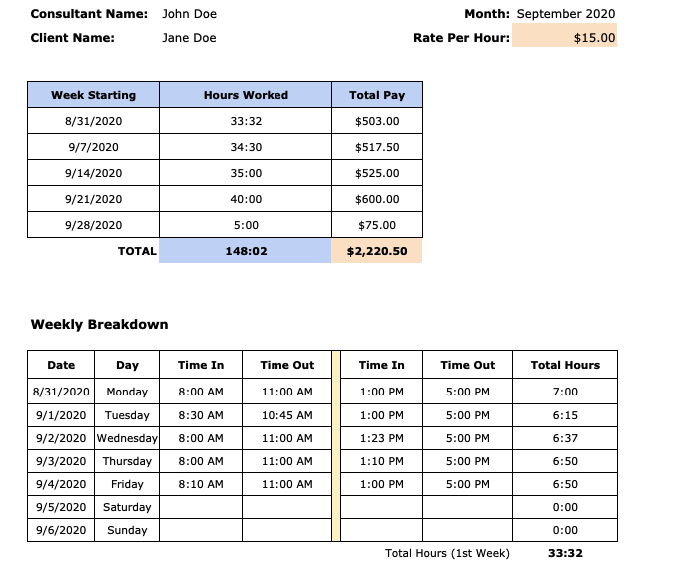When it comes to managing projects, keeping track of time is crucial for ensuring productivity, meeting deadlines, and staying within budget. This is where consulting timesheets play a vital role. A consulting timesheet is a tool used to record the time spent on each task or project by consultants or employees.
Using a consulting timesheet allows project managers to monitor the progress of their team members, allocate resources effectively, and accurately bill clients for the work done. It provides a comprehensive overview of how time is being spent, enabling organizations to identify areas for improvement and optimize their processes.
What is a Consulting Timesheet?
A consulting timesheet is a document or software tool that tracks the time spent on various tasks and projects. It typically includes columns for the date, project or task name, client or company name, hours worked, and any additional notes or comments. Consultants or employees fill out these timesheets on a daily, weekly, or monthly basis, depending on the organization’s requirements.
Consulting timesheets can be either physical forms or digital templates. Many organizations now use online time-tracking software that allows employees to enter their hours and submit timesheets electronically. This not only saves time but also provides a centralized system for managing and analyzing time data.
Why Do We Need Consulting Timesheets?
Consulting timesheets offer several benefits for both consultants and project managers. Let’s explore some of the key reasons why they are essential in efficient project management:
1. Accurate Time Tracking:
Timesheets provide a detailed record of the time spent on each task or project, ensuring accurate time tracking. This allows project managers to analyze the productivity of their team members and identify any time-wasting activities or bottlenecks.
2. Resource Allocation:
By tracking the time spent on different projects, project managers can allocate resources more effectively. They can identify team members who have available capacity and redistribute work accordingly. This prevents overloading certain individuals and ensures a balanced workload.
3. Billing and Invoicing:
For consulting firms, accurate time tracking is crucial for billing clients. Timesheets provide the necessary documentation to support invoices, ensuring accurate and timely billing. This helps to maintain transparency with clients and avoid any disputes regarding the hours worked.
4. Project Cost Management:
Timesheets help project managers monitor the cost of each project by tracking the hours spent. This allows them to compare actual costs against budgeted costs and make necessary adjustments to stay within budget. It also helps in estimating future projects more accurately.
5. Performance Evaluation:
Timesheets provide valuable data for evaluating the performance of consultants or employees. Project managers can assess their productivity, identify areas for improvement, and provide targeted feedback. This promotes accountability and helps individuals grow in their roles.
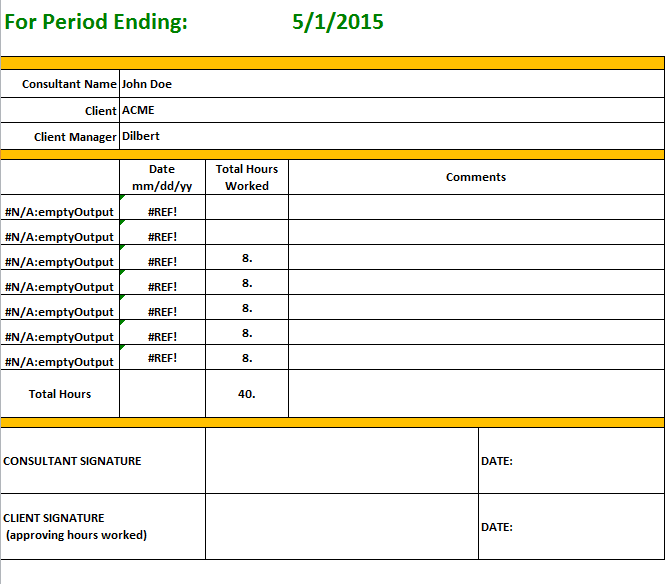
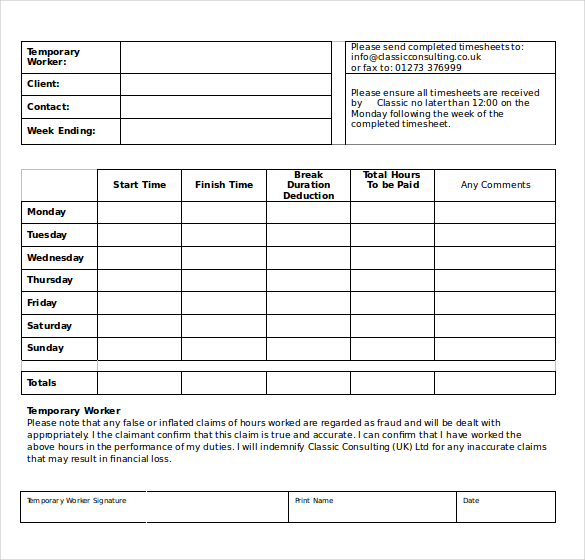
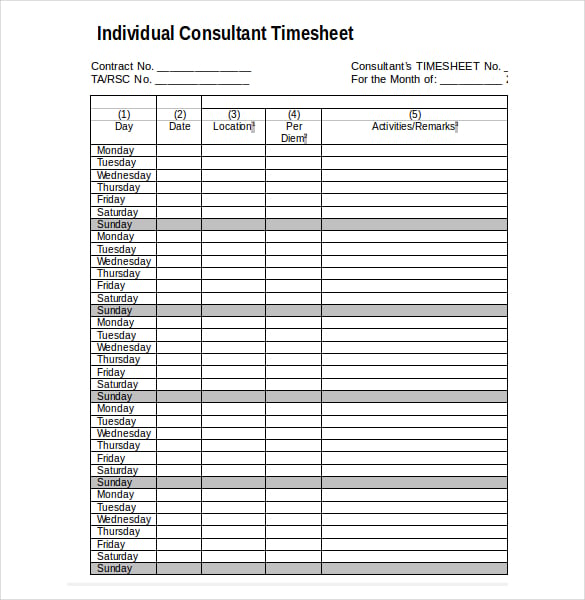
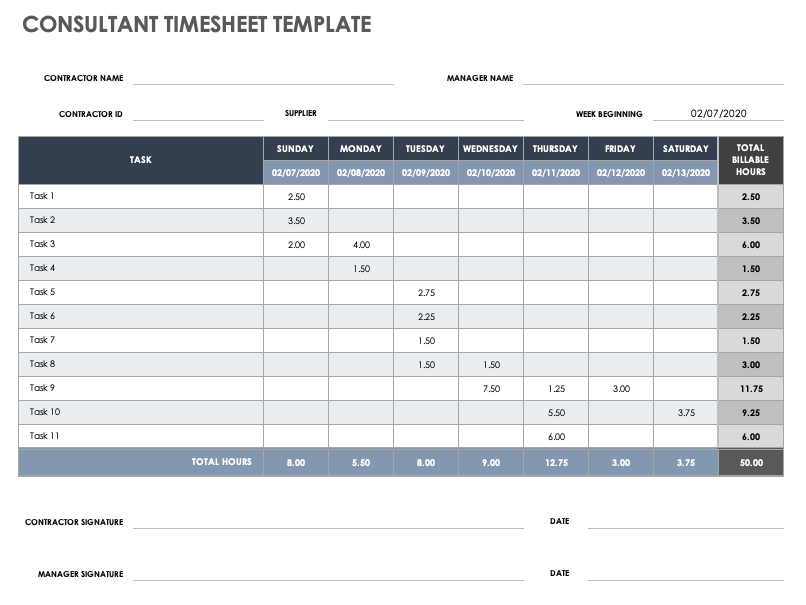
How to Create an Effective Consulting Timesheet?
Creating an effective consulting timesheet involves considering the specific needs and requirements of the organization. Here are some key steps to follow:
1. Identify Required Fields:
Determine the information that needs to be captured in the timesheet. This typically includes the date, project or task name, client or company name, hours worked, and any additional notes or comments. Custom fields can be added based on specific project or organizational needs.
2. Choose the Format:
Decide whether you want to use a physical timesheet form or an online time-tracking tool. Online tools offer more flexibility and automation, allowing for easier data analysis and reporting.
3. Define Submission Frequency:
Establish how frequently employees or consultants should submit their timesheets. This could be daily, weekly, or monthly, depending on the organization’s requirements and project timelines.
4. Communicate Expectations:
Communicate the importance of timesheet submission and provide guidelines on how to fill them out accurately. This ensures consistency and avoids any confusion or errors.
5. Train Employees:
Provide training to employees or consultants on how to use the timesheet effectively. This includes explaining the purpose, demonstrating the process, and addressing any questions or concerns.
6. Monitor and Review:
Regularly review the submitted timesheets to ensure accuracy and completeness. Address any discrepancies or missing information promptly to maintain data integrity.
Best Practices for Using Consulting Timesheets
- Consistency: Encourage employees to fill out their timesheets consistently and avoid procrastination. This ensures accurate and up-to-date time tracking.
- Detail-Oriented: Emphasize the importance of providing detailed information in timesheets, such as specific tasks or activities performed. This helps in analyzing productivity and identifying areas for improvement.
- Timeliness: Set deadlines for timesheet submission to ensure timely data collection. This allows project managers to make informed decisions based on real-time information.
- Integration: Consider integrating the timesheet data with other project management tools or systems to streamline processes and avoid duplication of efforts.
- Regular Reporting: Use the timesheet data to generate regular reports and dashboards. This provides valuable insights into resource utilization, project progress, and overall performance.
- Continuous Improvement: Regularly evaluate the effectiveness of the timesheet process and make necessary improvements. Solicit feedback from employees and project managers to identify any pain points or areas for optimization.
Conclusion
Consulting timesheets are essential tools for efficient project management. They enable accurate time tracking, resource allocation, billing and invoicing, project cost management, and performance evaluation. By following best practices and creating an effective timesheet process, organizations can enhance productivity, meet project deadlines, and achieve success in their consulting endeavors.
Consulting Timesheet Template Excel – Download
